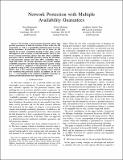Network protection with multiple availability guarantees
Author(s)
Narula-Tam, Aradhana; Kuperman, Gregory; Modiano, Eytan H.
DownloadModiano_Network protection.pdf (318.1Kb)
OPEN_ACCESS_POLICY
Open Access Policy
Creative Commons Attribution-Noncommercial-Share Alike
Terms of use
Metadata
Show full item recordAbstract
We develop a novel network protection scheme that provides guarantees on both the fraction of time a flow has full connectivity, as well as a quantifiable minimum grade of service during downtimes. In particular, a flow can be below the full demand for at most a maximum fraction of time; then, it must still support at least a fraction q of the full demand. This is in contrast to current protection schemes that offer either availability-guarantees with no bandwidth guarantees during the downtime, or full protection schemes that offer 100% availability after a single link failure. We develop algorithms that provide multiple availability guarantees and show that significant capacity savings can be achieved as compared to full protection. If a connection is allowed to drop to 50% of its bandwidth for 1 out of every 20 failures, then a 24% reduction in spare capacity can be achieved over traditional full protection schemes. In addition, for the case of q = 0, corresponding to the standard availability constraint, an optimal pseudo-polynomial time algorithm is presented.
Date issued
2012-06Department
Lincoln Laboratory; Massachusetts Institute of Technology. Department of Aeronautics and Astronautics; Massachusetts Institute of Technology. Laboratory for Information and Decision SystemsJournal
2012 IEEE International Conference on Communications (ICC)
Citation
Kuperman, Greg, Eytan Modiano, and Aradhana Narula-Tam. “Network protection with multiple availability guarantees.” In 2012 IEEE International Conference on Communications (ICC), 6241-6246. Institute of Electrical and Electronics Engineers, 2012.
Version: Author's final manuscript
Other identifiers
INSPEC Accession Number: 13154356
ISBN
978-1-4577-2053-6
978-1-4577-2052-9
978-1-4577-2051-2
ISSN
1550-3607